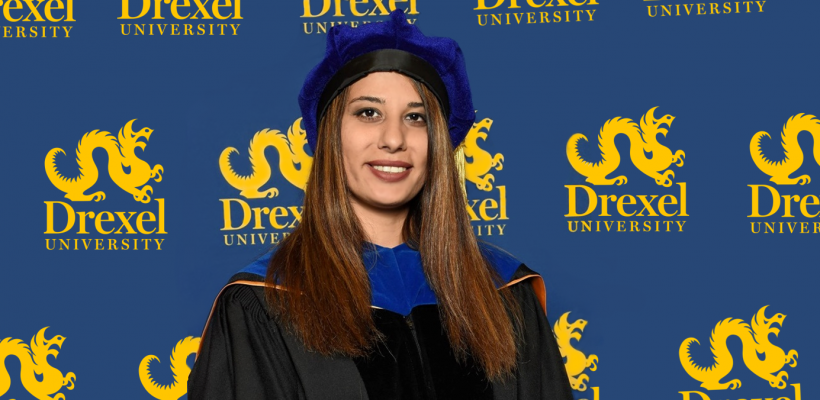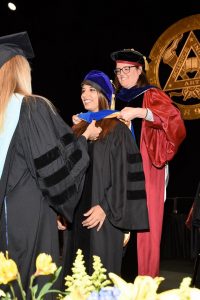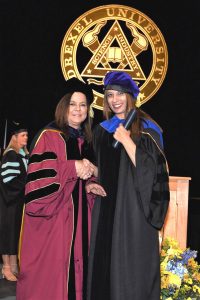
Alumni Success Story: Tamara Galoyan (MA TEFL ’13) Earns her PhD from Drexel University
5 min readThe American University of Armenia (AUA) is proud to share that AUA alumna Dr. Tamara Galoyan (MA TEFL ’13) was recently conferred her PhD degree from Drexel University, Philadelphia, U.S. Galoyan has combined her studies in Educational Leadership and Learning Technologies program (STEM concentration) in the School of Education and work as a research assistant and adjunct instructor. She is the founding co-editor of the Emerging Voices in Education Journal (EViE). Dr. Galoyan is the proud recipient of the School of Education PhD Student Research Excellence Award. In our interview she reflects on her educational experience at AUA and Drexel University, the challenges she faced, and much more.
Tell us about your educational background. Why did you decide to pursue a career in teaching?
I hold a master’s degree in TEFL (Teaching English as a Foreign Language) from the American University of Armenia (AUA) and a master’s degree in Linguistics from Yerevan State Linguistic University. The reason for pursuing a career in teaching and education research is that I love sharing knowledge and experience with my students, as well as learning from them. I also love conducting research on innovative pedagogical practices that enhance student learning, retention, and success across onsite, blended, and online learning environments. I have more than 10 years of professional experience in teaching, instructional design, and education research both in Armenia and the U.S. I have been teaching college students and adult learners in various educational institutions, including Drexel University, the American University of Armenia, Yerevan State Linguistic University, Anania Shirakatsy Lyceum, and the International Academy of Business in Armenia.
What is the most important lesson you learned at AUA?
I think one of the significant lessons that I learned while studying at AUA was the importance of making research-based and informed decisions when teaching and designing instruction. At AUA, I started researching and learning about innovative instructional technologies that triggered my interest in the field and encouraged me to pursue a PhD degree in the U.S.
What does being an AUA alumna mean to you?
I am proud to be an AUA alumna. I am thankful to all my AUA instructors, including my supervisor Dr. Irshat Madyarov, Lilianna Edilyan, Rubina Gasparyan, and Melissa Brown, among others, for the opportunity to receive high-quality education, their guidance, support, and encouragement. Also, I have nice memories of my years at AUA and will always hold warm feelings toward my classmates and the rest of the AUA community.
Tell us about your PhD research at the Drexel University School of Education.
 Overall, my PhD experience at Drexel University has been very rich and engaging. My research is multidisciplinary and lies at the intersection of Pedagogy, Neuroscience, and Cognitive Psychology. My broader research interests focus on neurocognitive, behavioral, and social factors affecting knowledge acquisition, transfer, and retention in onsite, online and blended learning, and immersive virtual environments, including video games, simulations, and AR/VR applications. I have been working on several NSF-funded and Drexel-funded research projects in collaboration with an interdisciplinary team of researchers, including educators, neuroscientists, psychologists, and engineers both within and outside Drexel University. I have presented the findings from these projects in more than 20 conferences worldwide and published in scholarly journals, books, government and technical reports, peer-reviewed conference proceedings, and research briefs. I received the Research Excellence Award 2018 and the Research Excellence Award 2019 from the School of Education at Drexel University based on the originality, creativity, and significance of my research endeavors.
Overall, my PhD experience at Drexel University has been very rich and engaging. My research is multidisciplinary and lies at the intersection of Pedagogy, Neuroscience, and Cognitive Psychology. My broader research interests focus on neurocognitive, behavioral, and social factors affecting knowledge acquisition, transfer, and retention in onsite, online and blended learning, and immersive virtual environments, including video games, simulations, and AR/VR applications. I have been working on several NSF-funded and Drexel-funded research projects in collaboration with an interdisciplinary team of researchers, including educators, neuroscientists, psychologists, and engineers both within and outside Drexel University. I have presented the findings from these projects in more than 20 conferences worldwide and published in scholarly journals, books, government and technical reports, peer-reviewed conference proceedings, and research briefs. I received the Research Excellence Award 2018 and the Research Excellence Award 2019 from the School of Education at Drexel University based on the originality, creativity, and significance of my research endeavors.
My dissertation is entitled, “Multidisciplinary Investigation into Neurocognitive Basis of Problem Solving Transfer and Implications for Pedagogy: A Mixed Methods Study.” The quantitative phase of this study focused on neurocognitive, behavioral, and task factors affecting transfer in a Spatial Navigation Transfer (SNT) game, a web-based application that I designed and developed specifically for my dissertation study in collaboration with Hovag Abramian, a computer scientist and an alumnus of AUA. The study used a randomized repeated-measures experimental design with the fNIRS brain imaging technology to measure mental workload in subjects during problem solving. The qualitative phase of this study used semi-structured interviews to explore university faculty’s conceptualizations of transfer within and across disciplines, and the instructional strategies they used to enhance learning and problem solving. Drawing upon Cognitive Load Theory and Mind, Brain, and Education sciences, this study is significant since it helps to advance understanding of how brain research can best inform pedagogy.
How are you going to implement the knowledge you have acquired there?
I hope that the knowledge and skills that I have acquired through multiple research initiatives will help me to advance understanding of how students learn and develop in technology-rich learning environments with pedagogy that fosters learning, transfer, and academic persistence.
Tell us about your research assistantship at Drexel University.
As part of my research assistantship, I had the privilege of working on multiple research projects both as a PI (Principal Investigator) and Co-PI with renowned researchers from both within and outside Drexel University.
One of the projects that I was working on for the past two years was a large-scale international study that examined the prevalence of neuromyths and awareness of evidence-based research from neuroscience, psychology, and education in higher education. The research team I was collaborating with included renowned faculty from Northern Arizona University, Taft College, FLASCO (Latin American Social Science Research Faculty, in Quito, Ecuador), Harvard University, Radboud University – Science Education Hub (Netherlands), American University, Loma Linda University, and the University of Toledo. This survey study was launched in late spring 2018 and was sent to approximately 7,000 educators worldwide. This project was the first international study that examined higher education pedagogy across onsite, blended/hybrid, and online learning with instructors, instructional designers, and professional development administrators. The study will be published in summer 2019 and provide critical data for an international report that will be available through the Online Learning Consortium as an open-access publication.
 Another interesting project I was working on examined the effects of immersive virtual reality (IVR) manipulative interventions on spatial visualization, transfer of learning, and student retention. This project received a Drexel University grant through the Provost’s Strategic Initiative. The study used the fNIRS neuroimaging tool to measure mental workload during the IVR manipulations.
Another interesting project I was working on examined the effects of immersive virtual reality (IVR) manipulative interventions on spatial visualization, transfer of learning, and student retention. This project received a Drexel University grant through the Provost’s Strategic Initiative. The study used the fNIRS neuroimaging tool to measure mental workload during the IVR manipulations.
I also received funding from the Provost’s Office for the eDUsuite project: Innovation center, Lab, and Repository. This project aimed at creating an innovative resource center for educators, students, and instructional designers at Drexel University.
During the first two years of my doctoral program, I was working at Drexel’s GLIDE (Games and Learning in Interactive Digital Environments) Lab. Our research focused on the affordances and limitations of immersive virtual environments, such as video games and simulations, for learning and learner identity exploration.
These were just a few of the multiple projects I was working on in my doctoral program. In addition to conducting research, I have also been serving as a founding co-editor of the inaugural Emerging Voices in Education (EViE) journal and as one of the editors for the Doctoral Student Research Briefs at the School of Education. For the past three years, I have also been working as an adjunct instructor at Drexel University where I have been teaching an online doctoral course on designing applications for learning.
What is the biggest challenge you have overcome during your educational journey?
I guess the biggest challenge that I learned to overcome over the past years is balancing multiple roles as student, researcher, instructor, and co-editor. Another challenge was to learn to simultaneously work on multiple interdisciplinary projects and collaborate with interdisciplinary teams.
Is there anything you would like to add?
I would like to thank AUA for this interview and opportunity to share my experience with the AUA community. I hope the story I shared will inspire other Armenian students to pursue an advanced degree and seek continuous improvement both as a person and a scholar.
